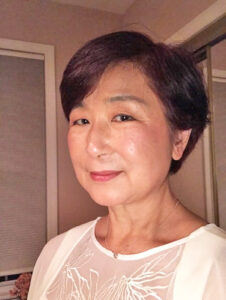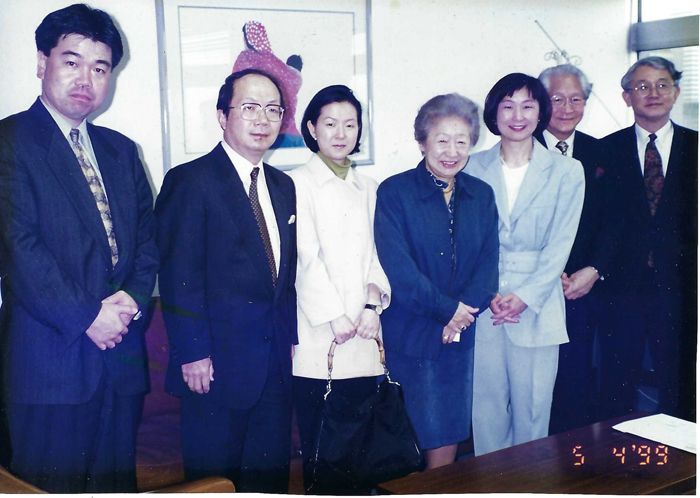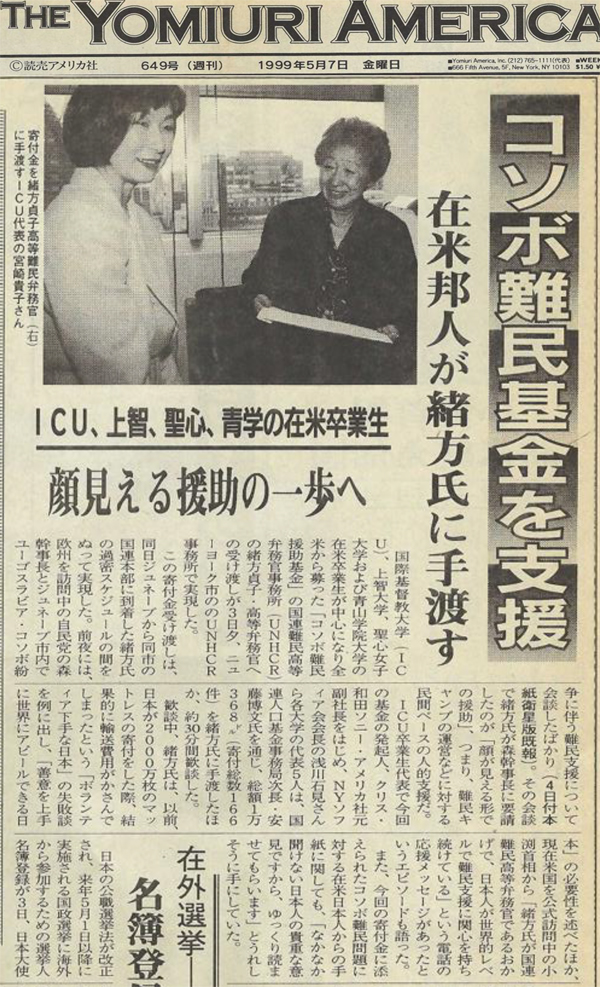ICU Alumna Ms. Takako Miyazaki Reflects on Her Encounters with Dr. Sadako Ogata

Ms. Takako Miyazaki majored in education psychology, and graduated from ICU in 1980. After graduation, she worked for corporations including Sony and TDK Electronics for over 25 years. Since 2006, she has been a freelance interpreter and consultant. Ms. Miyazaki has spent much of her life in the US, and served as the president of ICU’s Alumni Association in the Americas in the 1990s.
Recently, JICUF staff had the privilege of chatting with her, and learned that she had several memorable encounters with Dr. Sadako Ogata, the former United Nations High Commissioner for Refugees. Dr. Ogata taught at ICU in the 1960s and 70s. The essay below was shared by Ms. Miyazaki.
—————————————————————–
What I learned from Dr. Sadako Ogata through ICU AAA’s Activities
This year marks the 75th anniversary since ICU was founded. When Japan was left in ashes after the war, churches and educational institutions in North America and the Japanese business community led a huge fundraising campaign to establish ICU. I heard that $1 donation campaigns were run on American university campuses. The funds were thus raised in a rather short period of time by a multitude of people.
I served on the committee of the ICU Alumni Association in the Americas (ICU-AAA) from 1992 to 1999, and during my final year, I was able to participate in ICU’s 50th anniversary celebration as the AAA president. Among 200 guests, there were faces of original JICUF members who had dedicated themselves to fundraising for ICU after the war.
Among the various activities conducted by ICU-AAA during my tenure, I had precious opportunities to engage with Dr. Sadako Ogata, who served as the United Nations High Commissioner for Refugees (UNHCR). I would like to share some memories of my interactions with her.

The first one is the “Sadako Ogata Lecture” held in November 1994. When the ICU-AAA first approached her, Dr. Ogata responded that she would be willing to give a lecture if it were a joint event with other schools. We asked Sophia University and others to join us. On the day of the lecture, so many alumni gathered in the lecture hall that they could barely fit in.
The next one is the May 1999 fundraising campaign for Kosovar Refugees initiated by Chris Wada (former senior vice president of Sony USA and the first Japanese lobbyist). Chris and I shared the same alma mater (ICU) and workplace then.

“Takako, Kosovo!” It started with Chris’s cry. Four New York-based alumni associations (ICU, Sophia, Sacred Heart, and Aoyama Gakuin) got together, and in less than two weeks, we were able to raise more than $10,000 from 166 people and hand the funds to Dr. Ogata, who had just arrived at the UN from Geneva. (Yomiuri America 5/7/1999 article) Although it was small in scale, four Japanese university alumni associations bonded together to directly support Dr. Ogata through our grassroots efforts.
The last one is a sad memory. Just two months after meeting Dr. Ogata for the Kosovo donation, I received an e-mail from her. It was a letter of condolence for Chris Wada who suddenly passed away from a heart attack. Dr. Ogata talked about the memories of meeting Chris at the Kosovo fundraising campaign, and she praised his achievements as a bridge between the Japanese and U.S. business worlds. In response, I told her how happy Chris was on that day and how delicious the champagne tasted when he served it to us to celebrate the success of our campaign that night.
There are a few things I have learned through the activities related to Ms. Ogata. Fundraising should be done with a large group of people. Not one, but with many schools. Also, it is the leader’s passion, advocacy, and momentum which move people.
Later, when JICUF established a scholarship program for Syrian refugees, I immediately sent a check. An individual’s goodwill is like a drop in the ocean, but it is important to continue efforts to create a movement. In 2022, led by JICUF’s initiative, ICU announced that it would become one of the first universities in Japan to accept Ukrainian refugee students. Other universities followed suit. When I saw this on the TV news, I was immensely proud of ICU.
Lately, I heard that JICUF attended the annual UNHCR meeting. I hope that ICU will continue to be a pioneer in accepting refugee students from abroad, and that other universities in Japan also, as many as possible, will open the doors and extend their hands to the world.
Takako Miyazaki (Class of 1980, former President of ICU-AAA)



